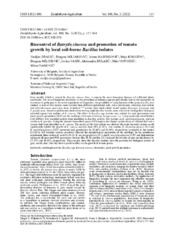Приказ основних података о документу
Biocontrol of Botrytis cinerea and promotion of tomato growth by local soil-borne Bacillus isolates
| dc.creator | Dragić, Vasiljka | |
| dc.creator | Miljaković, Dragana | |
| dc.creator | Marinković, Jelena | |
| dc.creator | Ignjatov, Maja | |
| dc.creator | Milošević, Dragana | |
| dc.creator | Vasin, Jovica | |
| dc.creator | Bulajić, Aleksandra | |
| dc.creator | Vojvodić, Mira | |
| dc.creator | Ivanović, Milan | |
| dc.date.accessioned | 2023-01-10T11:22:10Z | |
| dc.date.available | 2023-01-10T11:22:10Z | |
| dc.date.issued | 2022 | |
| dc.identifier.issn | 1392-3196 | |
| dc.identifier.uri | http://fiver.ifvcns.rs/handle/123456789/3251 | |
| dc.description.abstract | Grey mould, which is caused by Botrytis cinerea Pers., is among the most damaging diseases of cultivated plants worldwide. The use of fungicides dominates in the protection of tomatoes against grey mould. Due to the emergence of resistance of pathogens to the active ingredients of fungicides, the possibility of using bacteria of the genus Bacillus was studied. A total of 666 isolates were isolated from different agricultural soils, and a preliminary screening dual culture test with Alternaria dauci was done. A total of 77 isolates were dual culture tested against Fusarium tricinctum and F. proliferatum. Based on preliminary dual culture testing, eight Bacillus isolates were selected for testing their biological potential against two isolates of B. cinerea. The effect of Bacillus spp. isolates was studied for seed germination and plant growth promotion (PGP) on the seedlings of tomato (Solanum lycopersicum L.). Using molecular identification (16S rDNA), five bacterial isolates were identified as Bacillus subtilis, two isolates as B. amyloliquefaciens, and one isolate as B. pumilus. Using the Internal transcribed spacer (ITS) region, two fungal isolates from an infected leaf and a tomato fruit were identified as B. cinerea. The results of the dual culture test showed that eight bacterial isolates could significantly inhibit the growth of B. cinerea mycelia from 50% to 80%. Two isolates B. amyloliquefaciens 28.3 and B. amyloliquefaciens 21/IV increased seed germination by 85.66% and 86.16%, respectively, compared to the control (82.66%). All bacterial isolates positively affected the morphological parameters of the seedlings. In the greenhouse experiment, three isolates B. subtillis 20.10, B. amyloliquefaciens 28.3, and B. amyloliquefaciens 21/IV and their mixture increased all measured PGP parameters. Isolates Bac 20.10 and Bac 28.3 reduced the severity of grey mould disease by 27.47% and 30.36%, respectively. These results show that Bacillus isolates have the potential for biological control of grey mould; also, that they have a positive effect on the growth of tomato plants. | sr |
| dc.language.iso | en | sr |
| dc.publisher | Lithuanian Research Centre for Agriculture and Forestry, Vytautas Magnus University | sr |
| dc.relation | info:eu-repo/grantAgreement/MESTD/inst-2020/200116/RS// | sr |
| dc.relation | info:eu-repo/grantAgreement/MESTD/inst-2020/200032/RS// | sr |
| dc.rights | openAccess | sr |
| dc.rights.uri | https://creativecommons.org/licenses/by-nc-nd/4.0/ | |
| dc.source | Zemdirbyste-Agriculture | sr |
| dc.subject | antifungal activity | sr |
| dc.subject | Bacillus spp. | sr |
| dc.subject | Botrytis cinerea | sr |
| dc.subject | biocontrol | sr |
| dc.subject | plant growth promotion | sr |
| dc.title | Biocontrol of Botrytis cinerea and promotion of tomato growth by local soil-borne Bacillus isolates | sr |
| dc.type | article | sr |
| dc.rights.license | BY-NC-ND | sr |
| dc.citation.epage | 164 | |
| dc.citation.issue | 2 | |
| dc.citation.rank | M22 | |
| dc.citation.spage | 157 | |
| dc.citation.volume | 109 | |
| dc.identifier.doi | 10.13080/z-a.2022.109.020 | |
| dc.identifier.fulltext | http://fiver.ifvcns.rs/bitstream/id/9158/bitstream_9158.pdf | |
| dc.identifier.scopus | 2-s2.0-85132836847 | |
| dc.identifier.wos | 00081425440000 | |
| dc.type.version | publishedVersion | sr |


